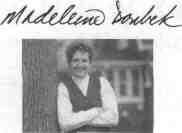A VIEW FROM THE SUBURBS

James 'Pate' Philip's rise
paralleled the suburban population
by Madeleine Doubek
Kirk Dillard was a 21-year-old Illinois Senate intern when he had his first encounter with James "Pate" Philip.
Clad in a 1970s polyester suit and sporting long sideburns, Philip blocked Dillard's path down a Senate aisle,
"Young man, you're from my county. How'd you get hired around here without my knowledge?" Dillard recalled being asked. "I'm just an intern, sir," the green kid responded. "I came from the university system."
Philip was neither Senate president nor Senate GOP leader back then, but he was an imposing figure, and the DuPage County GOP chairman with plans for amassing political power.
First elected to the legislature in 1967, Wood Dale resident Philip accrued that power and watched it grow over the past quarter century alongside the suburban population. (Chicago lost 567,278 residents between the 1970 census and last year. In the same period, the surrounding suburbs gained 1,355,010 residents.)
In the 1970s Philip was
an imposing figure. He
was the DuPage County GOP
chairman with plans
for amassing political power.
Philip is as big and brash as a 15-story condominium development amidst suburban ranch-style homes. And over the years, his politically incorrect attacks on Chicago schools and state child welfare workers have led many to shudder. Former state comptroller and Senate colleague Dawn dark Netsch says, "His terrible, blind, narrow tunnel vision is not representative of most of the suburbs." But others suggest Philip and fellow suburbanite, House Republican Leader Lee A. Daniels of Elmhurst, have been strong stewards of the growing suburban power, particularly over the past decade and a half.
As Chicago residents fled the city for the strong schools and increased safety of the more manicured suburbs during the past few decades, Philip, Daniels and their suburban legislative team worked with GOP governors to bring home the spoils.
Former Gov. Jim Thompson's Build Illinois program brought water system improvements, flood control and other infrastructure projects to the suburbs, notes now-Sen. Dillard, who has worked for Senate Republicans, Thompson and former Gov. Jim Edgar since that first Philip confrontation.
Suburban political power helped to produce property tax caps, welfare reform, Chicago school reform, experimental charter schools, state budget cuts and — for a time — tighter sentencing guidelines and civil lawsuit reform.
More suburban building projects are being designed as part of Gov. George Ryan's Illinois First public works plan and a multiuniversity center likely will land in Lake County.
Philip, in particular, also has flexed his political muscle by blocking proposals, including plans for an airport in south suburban Lake Calumet pushed by Chicago Mayor Richard Daley and a school funding swap sought by Edgar.
"Anything they want, they get," says state Sen. Vince Demuzio, a Carlinville Democrat who has served in the Senate with Philip since 1975.
"There's no question the suburbs have the power. If I had the votes, I'd probably be doing the same thing."
That power will only grow during the next quarter century. Philip's political cartographer, suburban political consultant Art Hanlon, says he expects the suburbs will gain three to five more seats after the 2000 census. The region's population grew by more than half a million between 1990 and 1998.
Noting Philip has not pushed conservative social policy like school prayer or strong abortion restrictions, Hanlon and Dillard argue Philip has reflected well the suburban residents he represents.
"Pate says what the suburbanites think," Hanlon says. "What happens on my block is the most important thing. Leave the bigger problems to someone else."
"He's got his finger on the pulse of what suburbanites want," says Dillard, "whether he personally agrees or not."
But Philip's era may be ending. Now 69 years old, he might just work through the next remap and retire after more than three decades in politics. And the reins of power just might land in the hands of that DuPage County intern he intimidated so long ago.
"The suburbs have gotten more of their fair share," Dillard says, and whoever Philip's successor is "will see that power increase."
Madeleine Doubek is assistant metro editor/projects & politics for the Daily Herald, a suburban metro newspaper.